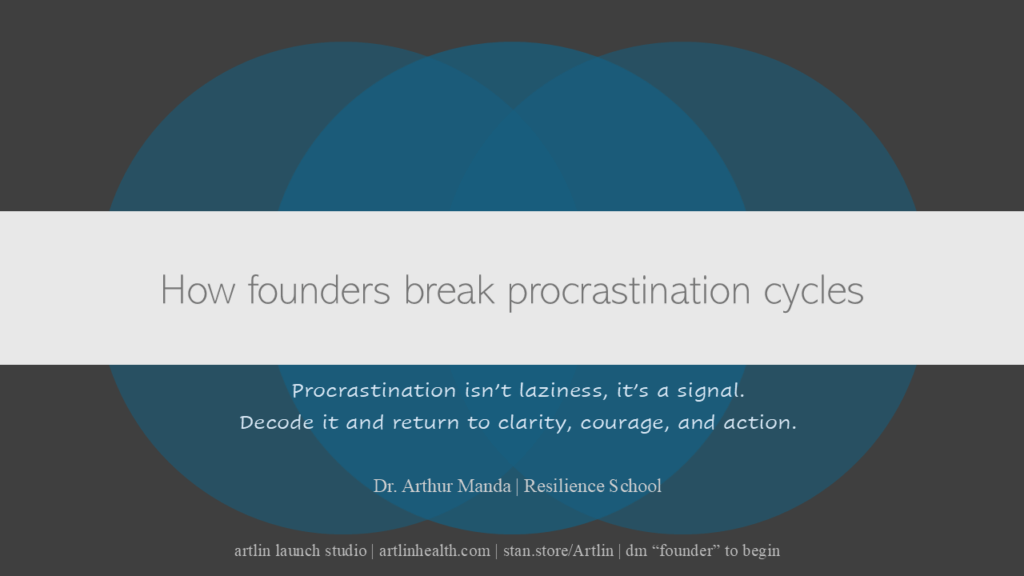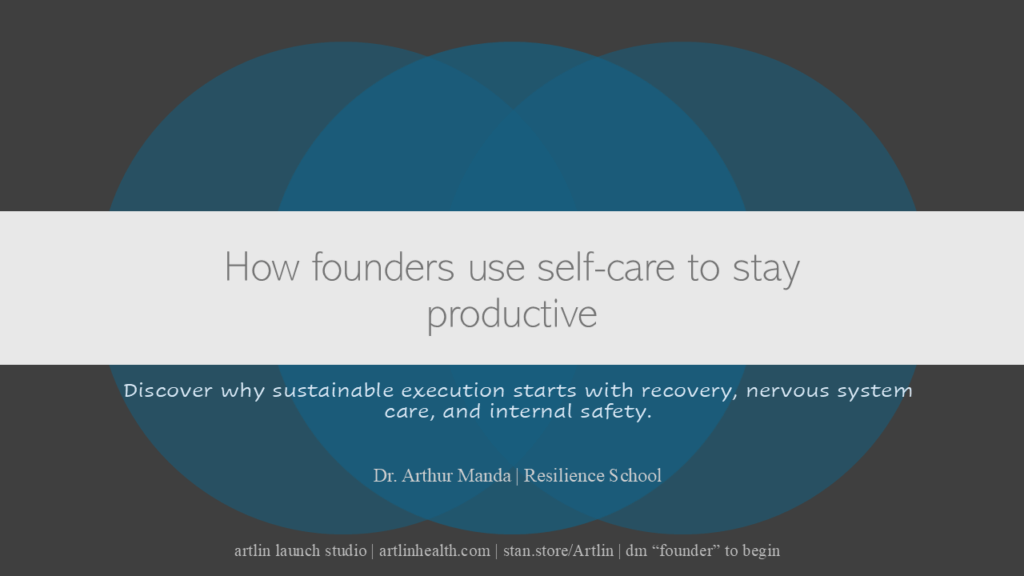You’re Not Lazy. You’re Overloaded.
Let’s begin here:
Procrastination is not a character flaw. It’s a nervous system signal.
When a biotech founder procrastinates, it’s often misread as laziness or poor discipline. But what’s actually happening is far deeper:
Your system doesn’t feel safe to act.
You’re not stuck because you don’t care.
You’re stuck because you care so much that the weight of it all has created internal shutdown.
This module is about rebuilding that momentum from the inside out.
Why Biotech Founders Procrastinate
Biotech isn’t like other fields. You’re carrying:
- Multi-year timelines
- Investor expectations
- Regulatory unknowns
- Scientific pressure
- Team leadership
- Your own survival
It’s no wonder your system sometimes hits freeze mode.
Common patterns behind procrastination in biotech founders include:
- Perfectionism: “If I don’t get it right, it’ll all collapse.”
- Imposter syndrome: “I shouldn’t be the one leading this.”
- Overwhelm: “There are 47 things I should be doing. I’ll do none.”
- Emotional fatigue: “I’m too tired to care — but I still care.”
- Fear of visibility: “If I launch this, I’ll be exposed.”
The result? Avoidance.
But under the avoidance is wisdom — and we can work with that.
The Founder Freeze Pattern
Most biotech founders oscillate between:
- High-energy sprints
- Sudden collapse or freeze
- Low-grade avoidance masked as “strategic thinking”
- Shame and internal criticism
- Repeat
This is not sustainable. And it’s not personal.
It’s biological.
Your nervous system is not wrong. It’s just overwhelmed — and it’s trying to protect you from what feels unsafe:
failure, embarrassment, burnout, or loss of control.
Tools to Exit the Freeze and Rebuild Momentum
These tools aren’t hacks — they’re pattern disruptors for nervous system reset and founder re-alignment.
1. Break the Binary
Stop asking “Should I do this or that?”
Instead: “What’s the smallest signal I can send right now that says I’m still in the game?”
→ Reply to one email
→ Open the pitch deck
→ Breathe through the first 30 seconds of discomfort
Small moves signal to your system: We’re not frozen anymore.
2. Name the Pattern Without Judgment
“I’m in freeze. That’s OK.”
“I want to move but my system doesn’t feel safe.”
Awareness reduces shame. Shame feeds avoidance. Kill the shame, and momentum returns.
3. Get Proximal to Momentum
Surround yourself with movement:
founders building, thinkers thinking, others showing up.
This activates your mirror neurons and helps you re-enter the field.
4. Regulate First, Act Second
Don’t force yourself to act from collapse.
Breathe. Shake. Walk. Cry. Re-enter.
Then build from safety, not stress.
5. Close the Open Loops
Make a short list of the 3 core things that are keeping you stuck.
Circle the easiest one. Do 10% of it.
Momentum is built by completion — not by pressure.
Procrastination Is Intelligence Misinterpreted
Avoidance is not weakness. It’s intelligence.
Your body-mind knows how heavy your mission is.
It simply needs calibration.
Don’t fix yourself.
Lead yourself.
Your platform is waiting.
Ready to Move Again? Enter the Studio.
You don’t need a course. You need a container.
A place to rewire the freeze → action loop.
To move from overthinking → execution.
That’s what Artlin Launch Studio (ALS) is.
Inside ALS, we don’t just talk mindset.
We build your biotech platform while rewiring the biological architecture that sustains it.
If you’re done being stuck:
DM “Launch Studio” or enter directly at https://stan.store/Artlin
Your next move doesn’t need to be perfect.
It just needs to be real.






